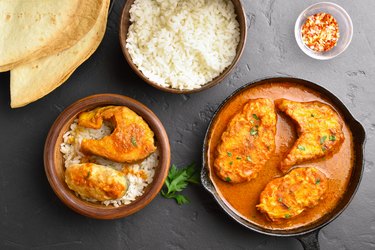
Curry is a staple part of the cuisine throughout East Asia and has spread to other countries. Although there is no standard definition for what makes up a "curry," dish, a curry recipe generally includes meat or vegetables and has a spiced sauce that may feature turmeric, cumin or coriander powder.
Depending on what exactly you put into it and how much you eat, curry can be quite healthy or extremely fattening. Track the ingredients of your curry dish on a calorie counter app to monitor its nutritional value.
Video of the Day
Video of the Day
Any type of "fattening" food can fit into a healthy, balanced diet if you moderate your portion sizes and focus on eating mostly natural, whole foods that are low in fat and calories and high in vitamins and minerals.
Tip
Curry dishes can be fattening, depending on the ingredients they are made with. The good news is that you can make some simple adjustments for a healthier version of this delicious dish.
Read more: Side Effects and Benefits of Curry Powder
Curry Recipe Nutrition Facts
Curry recipes that contain main components with high amounts of calories and fat — a creamy coconut milk base and fatty meats — will naturally be more fattening than those that feature veggies and plant-based fare.
For example, according to the USDA, 1 cup of lamb contains 222 calories and 13.2 grams of fat, but the same size serving of curried vegetables supplies just 158 calories and 6.7 grams of fat.
Massaman curry, a traditional Thai curry with peanuts and a creamy, coconut milk base, clocks in at 552 calories and 50 grams of fat per cup, while a cup of chicken curry has 194 calories and 8.3 grams of fat.
Consider the Ingredients
Ingredients really make all the difference in the final calorie count of a curry dish, which can help you determine whether it can make you gain weight or not. To put on body fat, you must consistently eat more calories than you burn.
It's possible, therefore, to maintain or even lose weight if you indulge in a rich curry daily, as long as you keep your total calorie count under control. But the converse is true too — it's possible to gain weight if you eat a healthy curry dish in addition to your usual fare.
Make Healthy Adjustments
To cut down on fat and calories in a homemade curry, use lighter ingredients. The USDA reports that 1 cup of regular coconut milk has 399 calories and 36 grams of fat.
Coconut water can be used instead, providing only 91.2 calories and no fat — but your dish won't have the same thickness or creaminess that you may be used to. Or try using low-sodium chicken broth as an ingredient in your curry sauce rather than using a rich cream base.
If you use oil to sauté or fry curry ingredients, try to maintain small serving sizes. It can also help to eat curry in small portions and to minimize high-calorie accompaniments, such as refined white rice and fried bread.
- USDA FoodData Central: "Lamb or Mutton Curry"
- USDA FoodData Central: "Vegetable Curry"
- USDA FoodData Central: "Massaman Curry"
- USDA FoodData Central: "Coconut Milk"
- USDA FoodData Central: "Coconut Water"
- Mayo Clinic News Network: "Tuesday Q & A: Reducing Four White Foods May Make It Easier to Eat Less, Lose Weight"